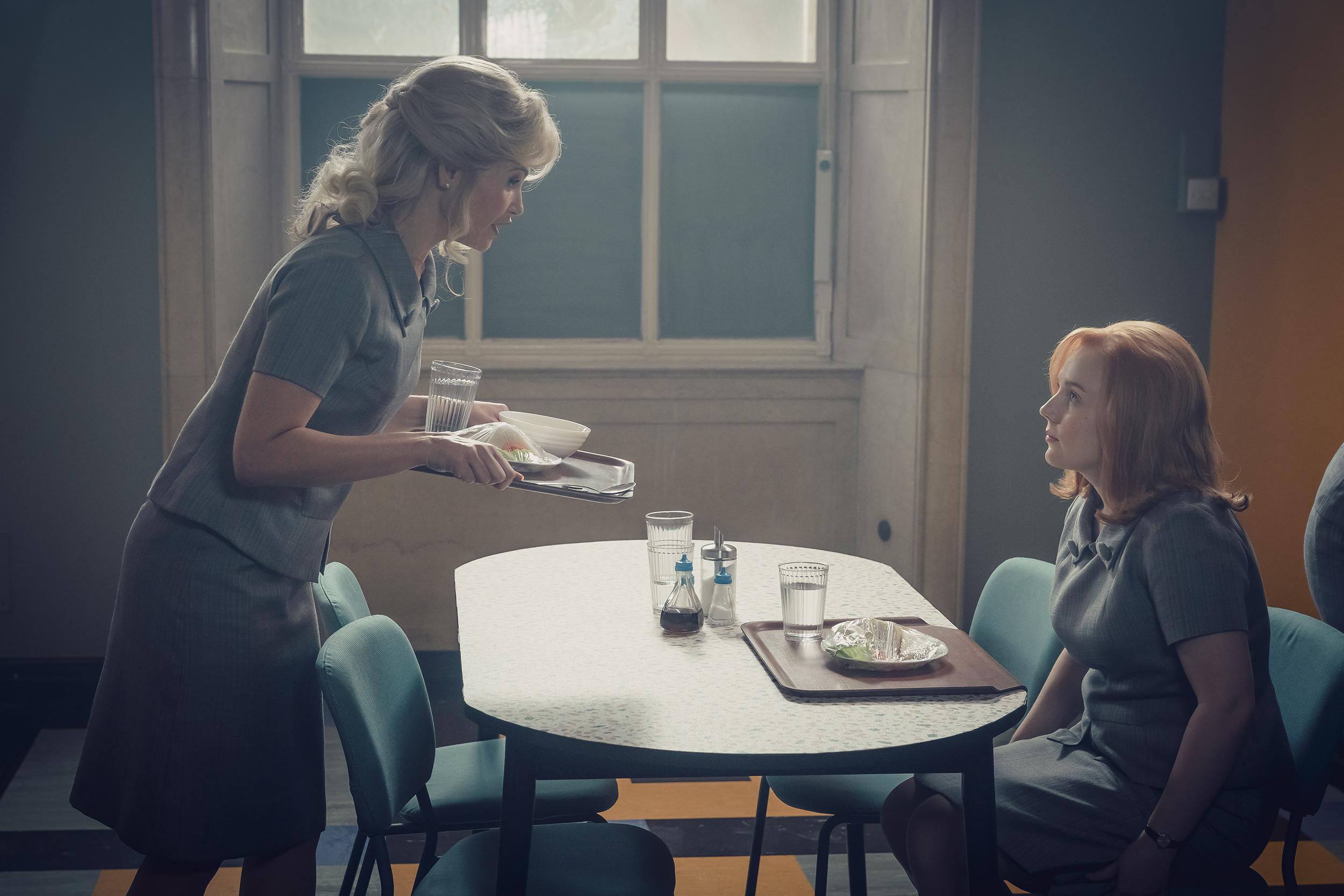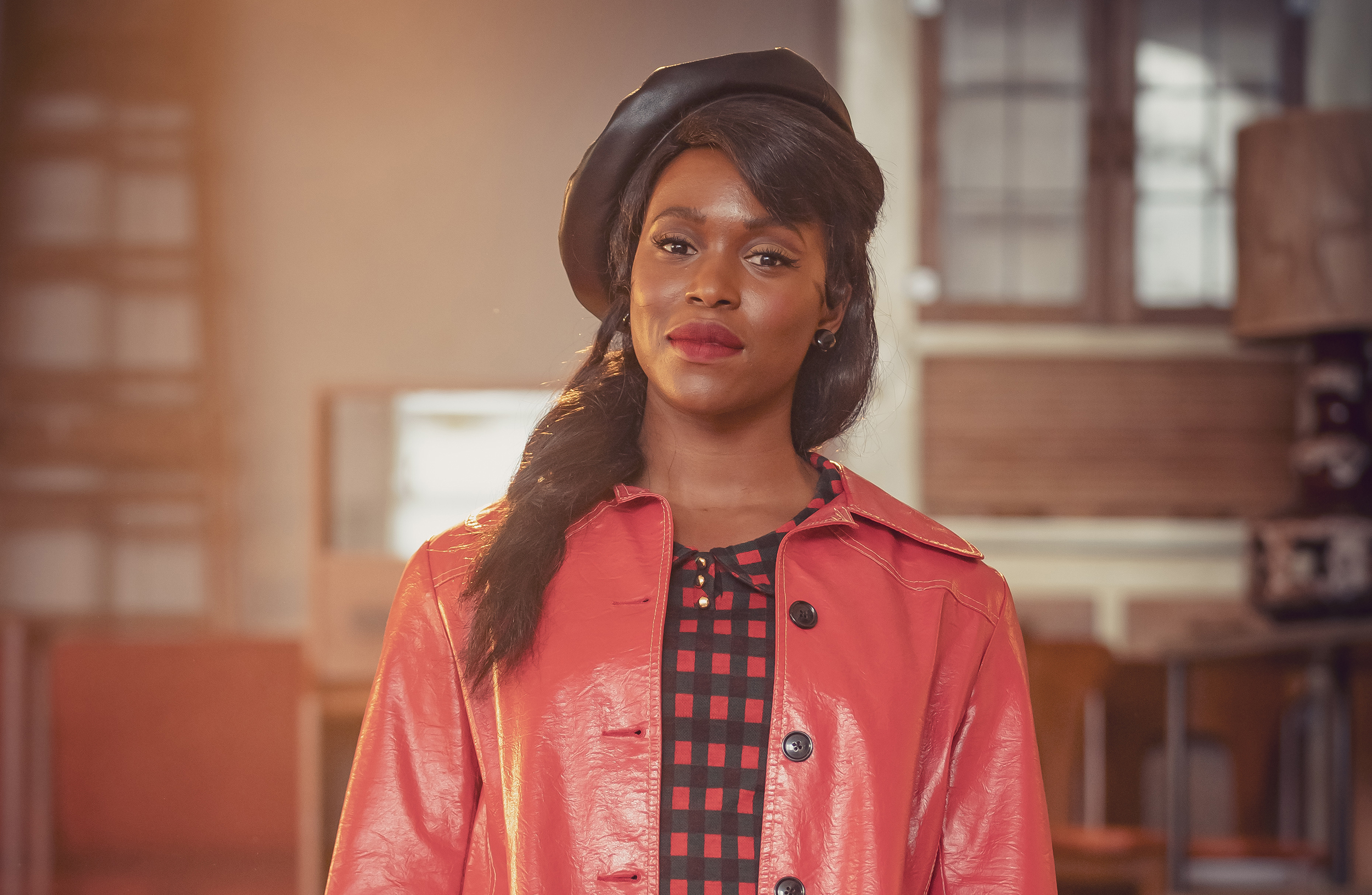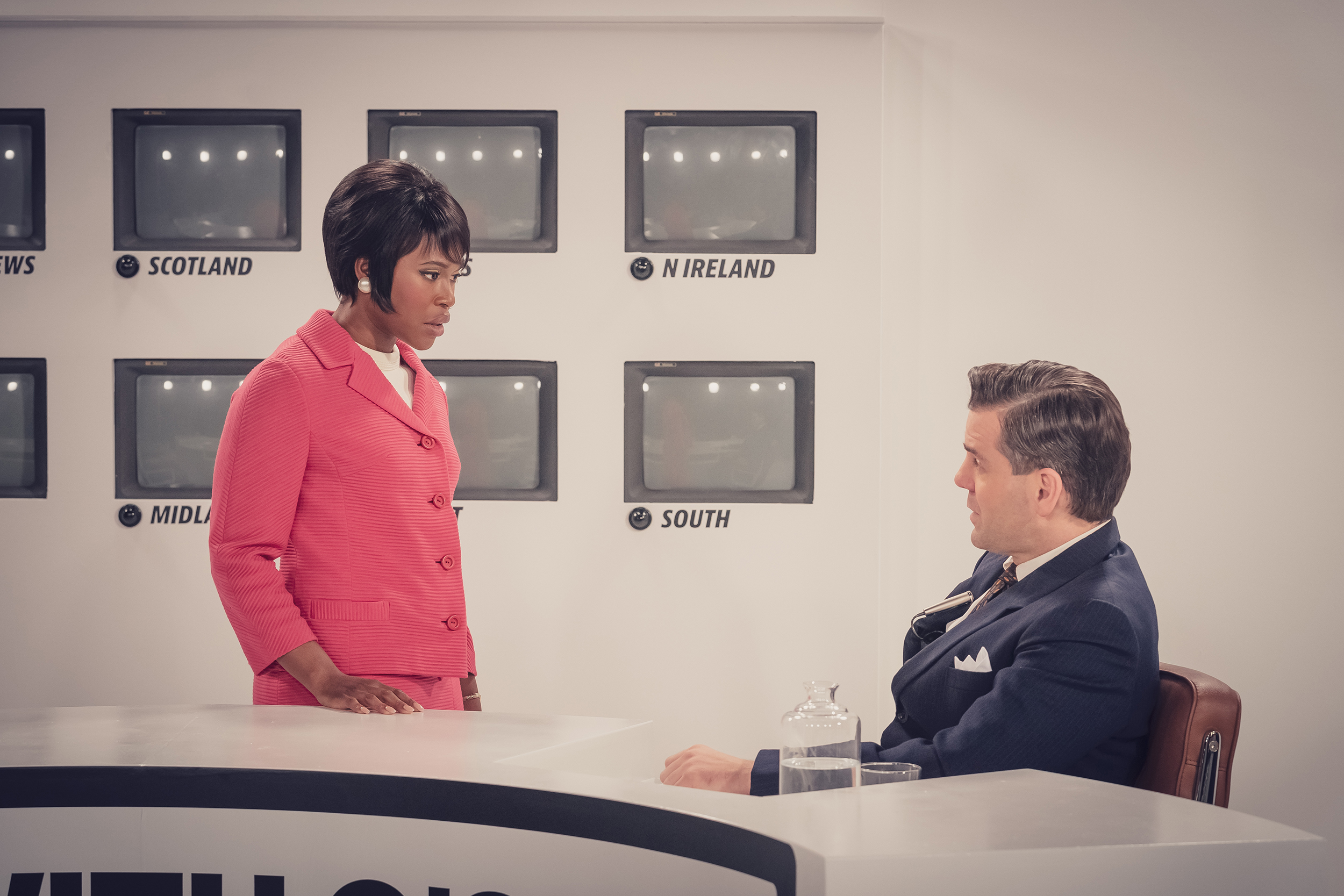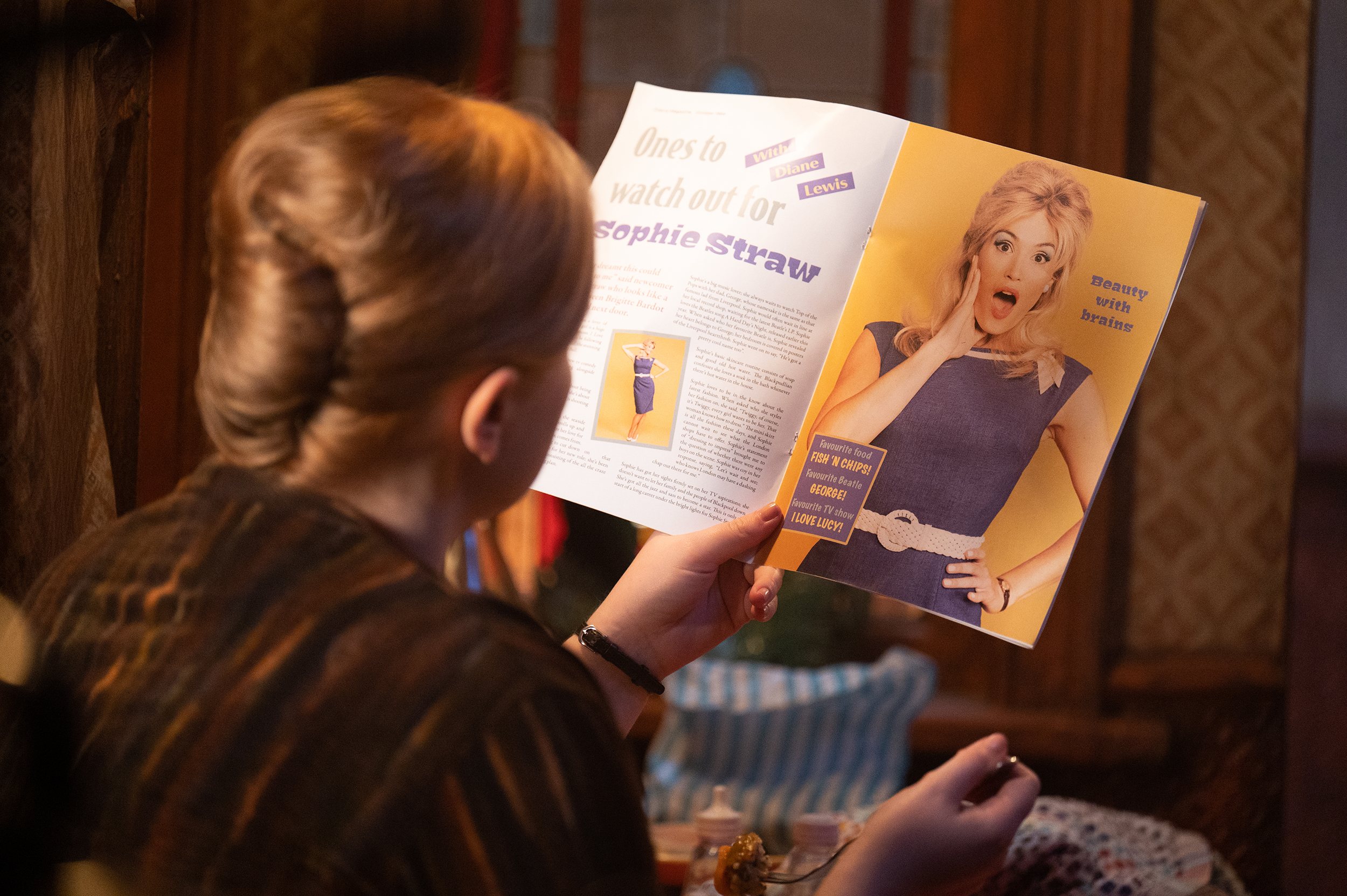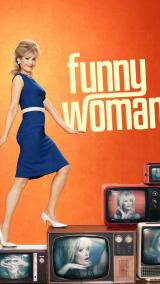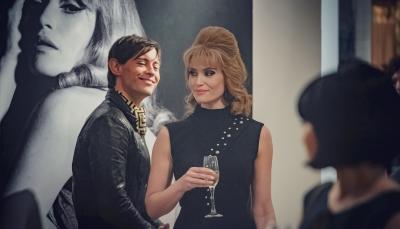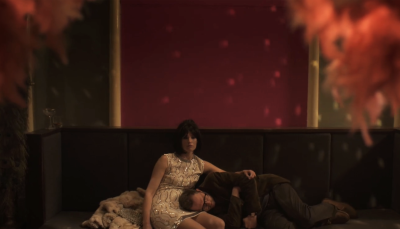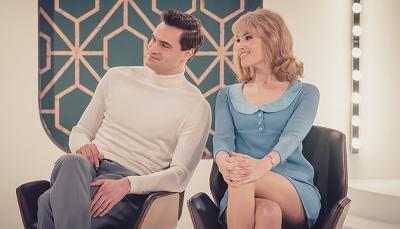A Conversation With ‘Funny Woman’s Very Supportive Supporting Cast
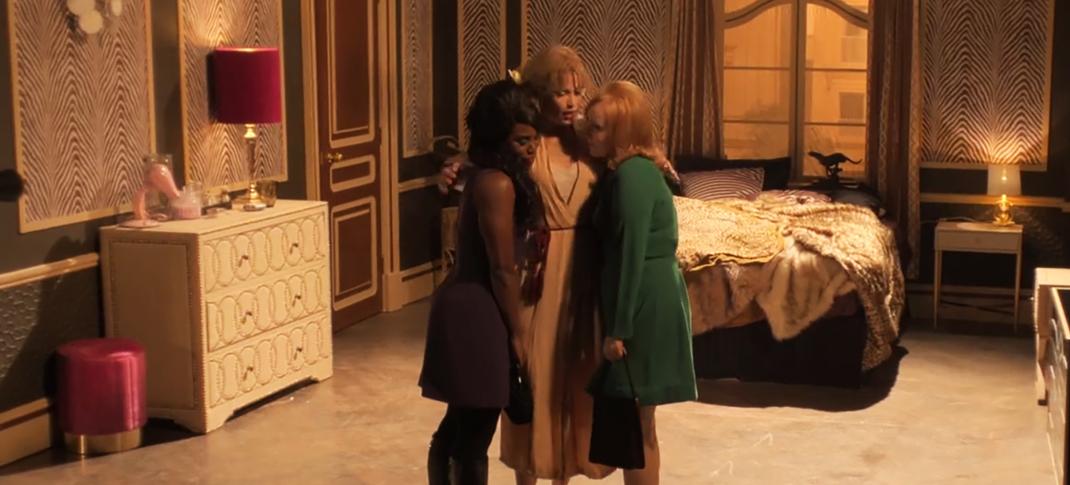
Gemma Arterton, Clare-Hope Ashitey, and Alexa Davies as best buds Barbara, Diane, and Marge in 'Funny Woman' Season 1
© Potboiler Productions; © Sky UK Limited
In the first season of ITV’s Funny Woman, Gemma Arterton as Barbara Parker (stage name: Sophie Straw) is unquestionably the sun around whom everyone else revolves, but Barbara’s besties, Diane and Marge (Clare-Hope Ashitey and Alexa Davies, respectively), provide extra zing, oomph, and mutual support to her life in London. Each member of the trio brings distinct qualities, experiences, and perspectives to the table.
Diane is the daughter of West Indian immigrants who are members of the Windrush generation and is by far the best-educated and profession-tracked of the three. She’s been to university, and we see her work her way up from a magazine for teen girls to a women’s interest magazine to a news magazine TV show. Marge is a solidly striving working-class woman from Croydon who befriends Barbara in the canteen at the snooty department store where they both work for a time. She begins to find her voice when she joins a women’s consciousness-raising group and develops a more critically-minded understanding of her gender, class, and standing in society as a whole.
Barbara is working class like Marge, but like Diane, experiences another facet of marginalization in Swinging London — her pronounced Blackpool accent, which so many people in the South of England associate with a lack of intelligence and sophistication. It’s a credit to each of these women that they see the kindred spirit in each other.
Both Ashitey and Davies spoke with Telly Visions about what drew them to Funny Woman, their experiences developing and playing Diane and Marge, and what the second season — which recently wrapped shooting in Liverpool — may hold.
A Period Piece With Lots of Heart and Verisimilitude
Working on a mid-1960s period piece immediately appealed to Ashitey and Davies. Ashitey was particularly sold on the series’ “aesthetic, language, and social setting” and loved that “there was so much heart in the script—the characters were really interesting and multi-dimensional.” She noted the rarity of female characters of color. “You often find it incredibly flat, and they’re there to fulfill a particular thing that gives dimension to other characters.”
Similarly, Davies’ natural affinity for the glamour of a role in a 1960s setting, combined with her longstanding admiration of Nick Hornby and the quality of the scripts by co-creator and series head writer Morwenna Banks, all played a role. Of Banks, Davies enthused, “She gave us genuinely funny scenes. Being part of an onscreen female friendship that’s so wonderfully written really pulled me in.”
Both actors appreciated how the friendship trio developed throughout Funny Woman’s first season, as well. Davies liked the natural progression of it, as Barbara moves in to split the cost of her walk-up flat and subsequently brings out some sociability and openness to new-to-her experiences. “By the time Diane is introduced to Marge, she’s ready for more friends” and enjoys it “because, at the end of the day, they have the same morals and basic desires in life.” Ashitey highlighted the naturalistic push-and-pull of the trio’s developing friendships, describing the dynamic as “just human beings trying to find connection, maybe being a bit jealous, a bit tentative, and making themselves vulnerable or closing themselves off” at different points.
Navigating A Narrow Path
The presumed narrowness of options for women, people of color, and queer folks in 1964 Great Britain plays a significant role in their friendships and professional lives, too. Absent her friendships with Barbara and Diane and her subsequent understanding of how women get enlisted to enforce gender roles that aren’t working, it’s hard to imagine Marge doing something transgressive. But in a later episode, she dumps a bowl of custard on the head of one of the nastier young women at the department store for her insinuations that Barbara is a tramp and Marge must be a lesbian for sticking up for her friend.
When Marge reaches “the height of her change and decides she’s not going to lie down and take [this bullying and cruelty] anymore,” it’s a nearly 180-degree turn from a scene in the first episode where she all but scolds Barbara for being surprised that her date at Talk of the Town would expect sex in exchange for paying for their evening out.
Diane’s professional arc mirrors a fair bit of Marge’s social arc, culminating in her walking off-set after correctly pointing out the subtle and not-so-subtle racism operating at every level of the news magazine she’s been co-anchoring. Ashitey had some concerns about what professional consequences Diane might face for taking such a bold leap without much of a net, but also notes that she had arrived “at a point where that’s the only thing left that she can do because we all have our limits.” Even if the future holds a rougher path due to Diane’s act of gutsy self-preservation, Ashitey’s “biggest wish for her is to be proud of how she stood up with herself, holding onto that confidence and taking it forward.”
1964: The Times, They Were Well and Truly A-Changin’
The mid-1960s were a critical transitional period for Great Britain, and it wasn’t all due to The Beatles. Popular music, fashion, and TV of the era both drove and reflected the changing times, which included more openness about sexuality, race, and class. One aspect of the era that Funny Woman addresses in Diane’s character arc is the integration of citizens of Commonwealth nations, most of whom were people of color. The final straw for Diane at the news magazine is her co-anchors admission that he was so keen to interview Enoch Powell, an MP notorious for his racist, xenophobic views, that he acquiesced to Powell’s demand that Diane is not present for the interview.
Ashitey appreciates the way that Funny Woman includes both the more fun aspects of British culture at the time, and “this whole strata of life that was really bleak…a lot of those things get repressed and forgotten, when they need to be talked about” more than 60 years later. Viewers interested in more scripted shows that dig into the shifting racial, cultural, and social landscape of Great Britain in this period may enjoy Three Little Birds on BritBox and Call The Midwife’s most recent seasons.
Costume Design Now and Later
Major societal shifts sit side-by-side with the lighter aspects of shooting a very groovy-looking show, too. Davies and Ashitey both commended the series’ costume designer for the combination of era-specific pieces and wardrobe pieces explicitly created for the show. For Ashitey, the careful curation of Diane’s wardrobe unlocked a great deal of her character for her: “You start to build back from that, and think about what that might mean, and why it might be.”
Ultimately, she views Diane’s wardrobe as “a kind of armor for her,” which proves crucial in how she presents herself and navigates predominantly white social and professional spaces. Davies teased “a bit of a change in Season 2 in Marge’s costumes because her world is bigger. She has more of an idea of who she is and how to express that with clothes.”
Funny Woman Season 1 is streaming for US viewers on PBS Passport. PBS has not yet announced when the second season will air here, but it is expected sometime in 2025.

